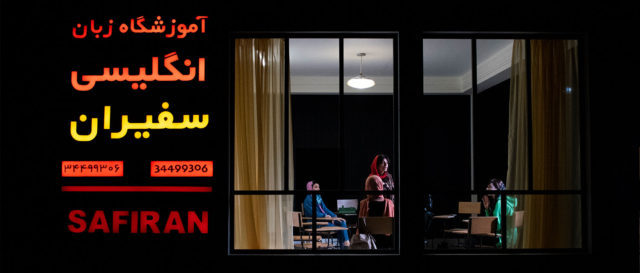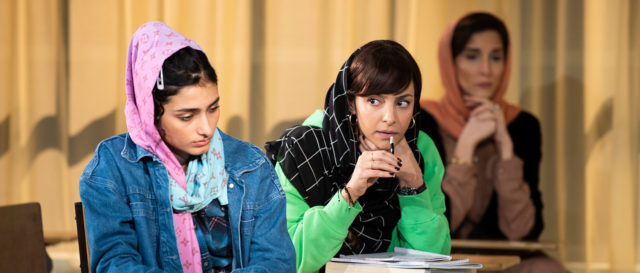
Sanaz Toossi’s English takes place in a TOEFL class in Iran (photo by Ahron R. Foster)
ENGLISH
Atlantic Theater Company
Linda Gross Theater
336 West 20th St. between Eighth & Ninth Aves.
Tuesday – Sunday through March 20, $76.50
866-811-4111
atlantictheater.org
Concepts of home and personal identity lie at the heart of Sanaz Toossi’s poignant and involving English, which opens tonight at the Atlantic’s Linda Gross Theater. A coproduction with Roundabout Underground, the play is set in a small classroom in Karaj, Iran, in 2008, where Marjan (Marjan Neshat) is teaching basic English to four students who are planning on taking the TOEFL, the Test of English as a Foreign Language, for very different reasons. Marjan insists that they speak only English in the class rather than Farsi, their native tongue.
Roya (Pooya Mohseni) wants to be able to speak with her new granddaughter, who lives in Canada with Roya’s son and his wife and is not being raised to speak Farsi. “I hope you not forget. Nate is not your name,” she tells her son, who used to be known as Nader.
Elham (Tala Ashe) has passed her MCATs but needs to learn English so she can study gastroenterology in Australia. “My accent is a war crime,” she angrily admits.
Omid (Hadi Tabbal) has an upcoming green card interview in Dubai, but his English is already excellent, nearly accentless. When asked why people learn language, he says, “To bring the inside to the outside.”
Goli (Ava Lalezarzadeh) is an eighteen-year-old girl who wants to speak like Shakira. “People like accent,” she says, not ashamed of who she is.
After a presentation by Goli doesn’t go particularly well, Marjan, a married woman who spent nine years in Manchester before moving back to Iran with her family, says, “Don’t be sorry! We were speaking English with each other. I think it’s one of the greatest things two people can do together.”

Four students and a teacher learn about life and language in English (photo by Ahron R. Foster)
They play word games, do show-and-tell, and discuss English vs. Farsi. “I want to speak English. Before I speak Farsi good, I know I want to speak English,” Goli says. “English does not want to be poetry like Farsi. It is like some rice. English is the rice. You take some rice and you make the rice whatever you want.”
Roya resents having to learn English and is furious that her son has turned away from his culture, projecting that rage onto her teacher. “You talk about Farsi like it’s a stench after a long day’s work. Tell me, Marjan, what is it about where we’re from that you find so repulsive?” she argues.
As Elham’s frustration with English builds — she repeatedly uses Farsi in class, accumulating negative points — she gets into disagreements with everyone else, speaking frankly, without apology. “Goli, people hear your accent and they go oh my god it is so funny you are so stupid. . . . Okay if I have accent, bad TOEFL score. Omid has accent, no green card. Roya’s accent? Disaster.” Some of them equate the attempted erasure of their Iranian accent when speaking English with the loss of who they are, as if they are surrendering their unique culture. “Don’t you think people can do us the courtesy of learning our names?” Elham says to Marjan, who went by “Mary” when she lived in England.
“English isn’t your enemy,” Marjan insists. “English is not to be conquered. Embrace it. You can be all the things you are in Farsi in English, too. I always liked myself better in English.” But Marjan won’t acknowledge to herself that that is exactly the problem. “I feel like I’m disappearing,” she says later to Omid.

Goli (Ava Lalezarzadeh), Elham (Tala Ashe), and Roya (Pooya Mohseni) think about their futures in Atlantic world premiere (photo by Ahron R. Foster)
English is beautifully written by Toossi and gracefully directed by Knud Adams (Paris, The Headlands), giving each character room to develop. Although they go back and forth between English and Farsi, the latter is never heard; whenever they speak English, the actors use Iranian accents, but when they talk in Farsi, they lose the accent, sounding like plain old longtime Americans, a device that serves as a metaphor for colonialism, nation-building, and ethnocentrism. It’s no coincidence that the song Goli plays for show-and-tell is Shakira’s “Whenever, Wherever,” in which the Colombian-born singer and dancer proclaims, “Lucky you were born that far away so we could both make fun of distance / Lucky that I love a foreign land for the lucky fact of your existence.”
Marsha Ginsberg’s revolving cube set is open on two sides, evoking the inside and the outside. Enver Chakartash’s costumes meld traditional Iranian clothing, like head scarves, with American accents. The cast is exceptional, quickly forming a cohesive unit; it probably wouldn’t be too much of a stretch to assume they have each had to deal with the issue of making sacrifices to learn a new language and culture in some way, as all of them, in addition to the bilingual Toossi, were either born in Iran or Lebanon or their parents were. English was actually Toossi’s NYU thesis, written in response to Donald Trump’s Muslim travel ban and anti-immigration policies.
About halfway through the play, Marjan tells the class, “If you are here to learn English, I am going to ask you to agree that here in this room we are not Iranian. We are not even on this continent. Today I will ask you to feel any pull you have to your Iranian-ness and let it go. Keep it outside the wall of this classroom. In this room, we are native speakers. We think in English. We laugh in English. Our inhales, our exhales — we fill our lungs in English. No more Farsi. Can we agree to that? Yes? Thank you.” Toossi understands the kind of sacrifices it takes to make a new life in a new country while also realizing that the play’s audience is likely to be predominantly white non-Farsi speakers.
English continues at the Atlantic through March 20; Toossi’s Wish You Were Here, about a group of women (including one played by Neshat) facing tough choices as the 1978 revolution approaches, begins previews April 13 at Playwrights Horizons.